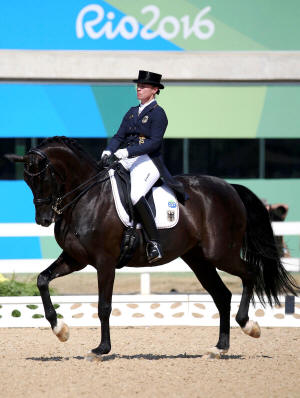Equestrian-Battling two deadly viruses, equestrian sports brace for
Tokyo
 Send a link to a friend
Send a link to a friend
 [June 29, 2021]
By Shadia Nasralla [June 29, 2021]
By Shadia Nasralla
LONDON (Reuters) - While the world
ground to a halt over the past year battling one deadly virus, the
world of equestrian sports approaches the Tokyo Olympics having had
to battle two diseases in recent months -- the novel coronavirus and
equine herpes virus.
In February, one year into the coronavirus pandemic and just as the
world began to emerge from some restrictions, an outbreak of the
equine herpes virus at a competition in Valencia, Spain, rattled the
sport.
"The Games were just five months away and everyone had a deep
concern over that," said Goran Akerstrom, veterinary director of the
international equestrian federation (FEI). "It was an extreme
outbreak."
FEI cancelled 78 competitive events in continental Europe - where
many equestrian athletes are based - in March and April and altered
its rules to allow some athletes to fulfil their eligibility
requirements for the Olympics despite the cancelled events.
Tokyo could see the sport's most decorated Olympian, Germany's
Isabell Werth, top her own medals record in dressage, also known as
horse ballet and one of the three equestrian disciplines alongside
jumping and eventing.

But she is set to have stiff competition from Britain's Charlotte
Dujardin, who won individual dressage gold at both previous Games.
Eventing, including a high-octane cross-country course with solid
obstacles, will see the British team try for gold, although France's
riders will attempt to repeat their gold-winning performances in
eventing and jumping from the Rio Games.
Host nation Japan placed third at the eventing Nations Cup final in
2019, raising hopes for a medal at home. The United States, Sweden,
the Netherlands and Australia are also medals contenders across the
equestrian disciplines.
Typically, horses and riders have a full competition schedule ahead
of the Games.
"You need to have them in a routine of competing every few weeks in
big atmospheres, with crowds, with clapping, with music, with flags,
to get the horses to settle into the routine," said Alex Hua Tian,
who will compete for China in Tokyo.
[to top of second column] |

Dressage Individual Grand Prix Freestyle
- Olympic Equestrian Centre - Rio de Janeiro, Brazil - 15/08/2016.
Isabell Werth (GER) of Germany riding Weihegold Old competes.
REUTERS/Tony Gentile

"To have a very quiet year last year,
followed by a very disrupted year this year, will certainly affect
rider, horse and their partnership and it'll be very interesting to
see how that plays out once we get to Tokyo."
While the COVID-19 virus does not jump from humans to horses or vice
versa, the herpes outbreak meant horses had to be separated from
each other and undergo nasal swab tests, similar to human
coronavirus tests, but with the probe going around 13 centimetres
deep into a horse's nostril.
"It was hard and it would have been difficult to continue with it
(for longer) but the measures stopped the outbreak," Akerstrom said.
The herpes virus, which causes horses respiratory or neurological
problems and abortion in pregnant mares, has killed 20 horses in the
recent outbreak.
"There was such an outpouring of support from the whole community.
There was a fund put together by some of the top riders that we all
put some money in to help support the riders who perhaps couldn't
afford the (intensive care unit) care for the horses that were
affected," Hua Tian said.
"Speaking to my fellow athletes from different nations, everyone is
clearly desperate for it to happen and we're all very willing to do
what it takes to try and make sure that the Games go ahead as safely
as possible."
(Reporting by Shadia Nasralla; Editing by Ken Ferris)
[© 2021 Thomson Reuters. All rights
reserved.]
Copyright 2021 Reuters. All rights reserved. This material may not be published,
broadcast, rewritten or redistributed.
Thompson Reuters is solely responsible for this content.
 |